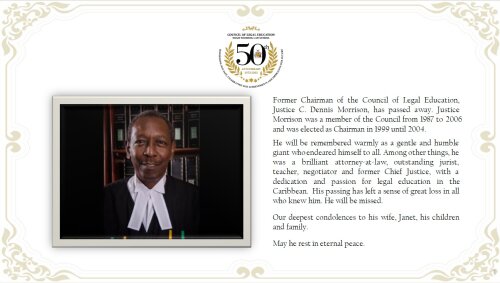Best Insurance Fraud Lawyers in Trinidad and Tobago
Share your needs with us, get contacted by law firms.
Free. Takes 2 min.
Or refine your search by selecting a city:
List of the best lawyers in Trinidad and Tobago
About Insurance Fraud Law in Trinidad and Tobago:
Insurance fraud in Trinidad and Tobago involves deliberately deceiving an insurance company for financial gain. This can happen through submitting false information, exaggerating claims, or staging accidents. Insurance fraud is a serious offense that can lead to legal consequences, including fines and imprisonment.
Why You May Need a Lawyer:
If you are being accused of insurance fraud, it is important to seek legal representation. A lawyer can help protect your rights, gather evidence to support your case, and navigate the legal process. Additionally, if you suspect someone else of committing insurance fraud, a lawyer can assist you in reporting the fraud to the relevant authorities.
Local Laws Overview:
In Trinidad and Tobago, insurance fraud is addressed under the Insurance Act. This legislation defines insurance fraud as any act of deception or misrepresentation in relation to an insurance policy. The penalties for insurance fraud can include hefty fines and even imprisonment. It is crucial to be aware of these laws and regulations to ensure compliance and avoid legal trouble.
Frequently Asked Questions:
Q: What are the common types of insurance fraud in Trinidad and Tobago?
A: Common types of insurance fraud include submitting false claims, exaggerating losses, and staging accidents.
Q: What are the potential consequences of insurance fraud in Trinidad and Tobago?
A: Insurance fraud can result in criminal charges, fines, imprisonment, and a tarnished reputation.
Q: How can I report suspected insurance fraud in Trinidad and Tobago?
A: You can report suspected insurance fraud to the Trinidad and Tobago Police Service or the Financial Intelligence Unit.
Q: What should I do if I am accused of insurance fraud in Trinidad and Tobago?
A: It is important to seek legal representation immediately and cooperate with authorities during the investigation process.
Q: Can I be held liable for insurance fraud committed by someone else in Trinidad and Tobago?
A: You may be held liable if you were aware of the fraud or benefited from it in any way.
Q: How can a lawyer help me with an insurance fraud case in Trinidad and Tobago?
A: A lawyer can provide legal advice, represent you in court, and help navigate the complex legal system.
Q: Is insurance fraud a civil or criminal offense in Trinidad and Tobago?
A: Insurance fraud is considered a criminal offense in Trinidad and Tobago.
Q: What is the statute of limitations for prosecuting insurance fraud in Trinidad and Tobago?
A: The statute of limitations for prosecuting insurance fraud varies depending on the specific circumstances of the case.
Q: Can I appeal a conviction for insurance fraud in Trinidad and Tobago?
A: Yes, you have the right to appeal a conviction for insurance fraud to a higher court.
Q: Are there any immunity or leniency programs for reporting insurance fraud in Trinidad and Tobago?
A: There are no specific immunity or leniency programs for reporting insurance fraud in Trinidad and Tobago, but cooperation with authorities may result in a more favorable outcome.
Additional Resources:
For more information on insurance fraud in Trinidad and Tobago, you can contact the Financial Intelligence Unit or consult legal professionals specializing in insurance law.
Next Steps:
If you require legal assistance in an insurance fraud case in Trinidad and Tobago, it is important to contact a qualified lawyer as soon as possible. They can provide guidance on how to proceed and advocate on your behalf throughout the legal process.
Lawzana helps you find the best lawyers and law firms in Trinidad and Tobago through a curated and pre-screened list of qualified legal professionals. Our platform offers rankings and detailed profiles of attorneys and law firms, allowing you to compare based on practice areas, including Insurance Fraud, experience, and client feedback.
Each profile includes a description of the firm's areas of practice, client reviews, team members and partners, year of establishment, spoken languages, office locations, contact information, social media presence, and any published articles or resources. Most firms on our platform speak English and are experienced in both local and international legal matters.
Get a quote from top-rated law firms in Trinidad and Tobago — quickly, securely, and without unnecessary hassle.
Disclaimer:
The information provided on this page is for general informational purposes only and does not constitute legal advice. While we strive to ensure the accuracy and relevance of the content, legal information may change over time, and interpretations of the law can vary. You should always consult with a qualified legal professional for advice specific to your situation.
We disclaim all liability for actions taken or not taken based on the content of this page. If you believe any information is incorrect or outdated, please contact us, and we will review and update it where appropriate.
Browse insurance fraud law firms by city in Trinidad and Tobago
Refine your search by selecting a city.









